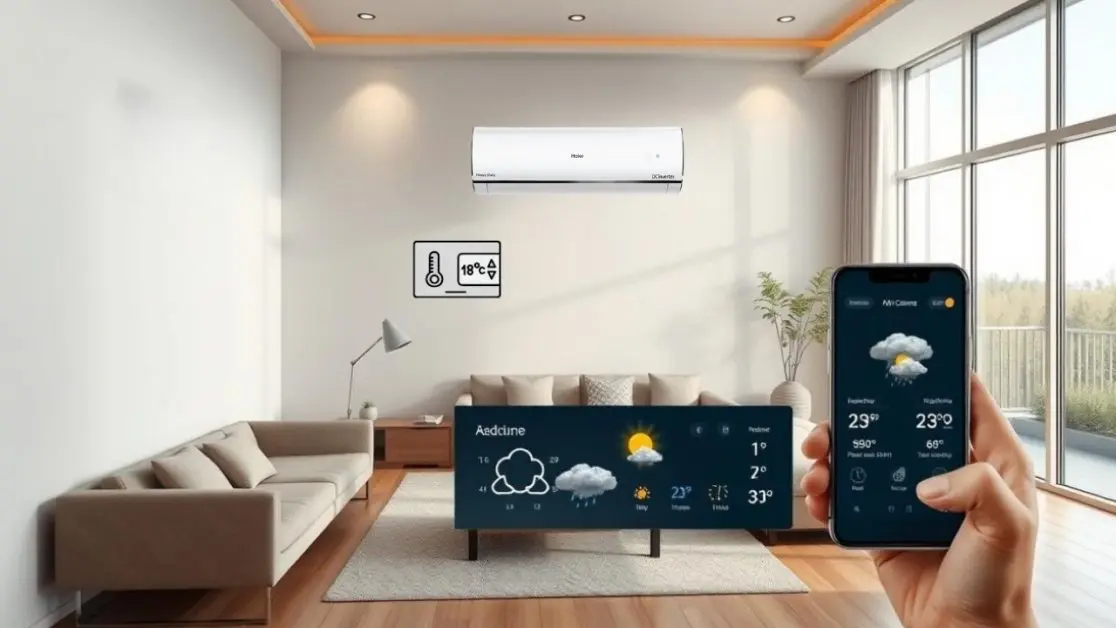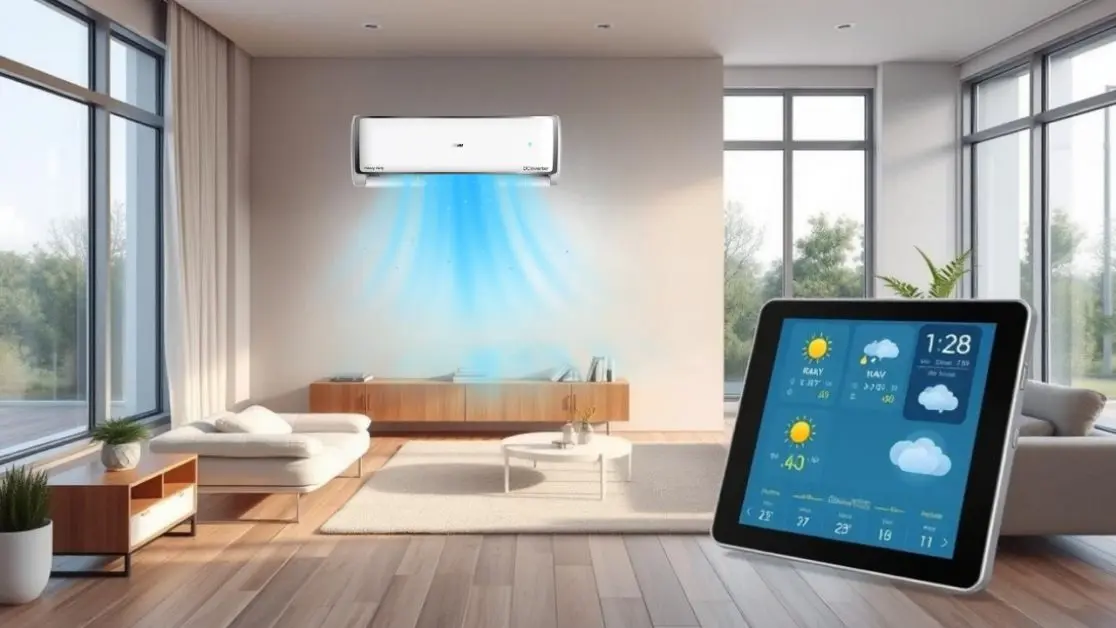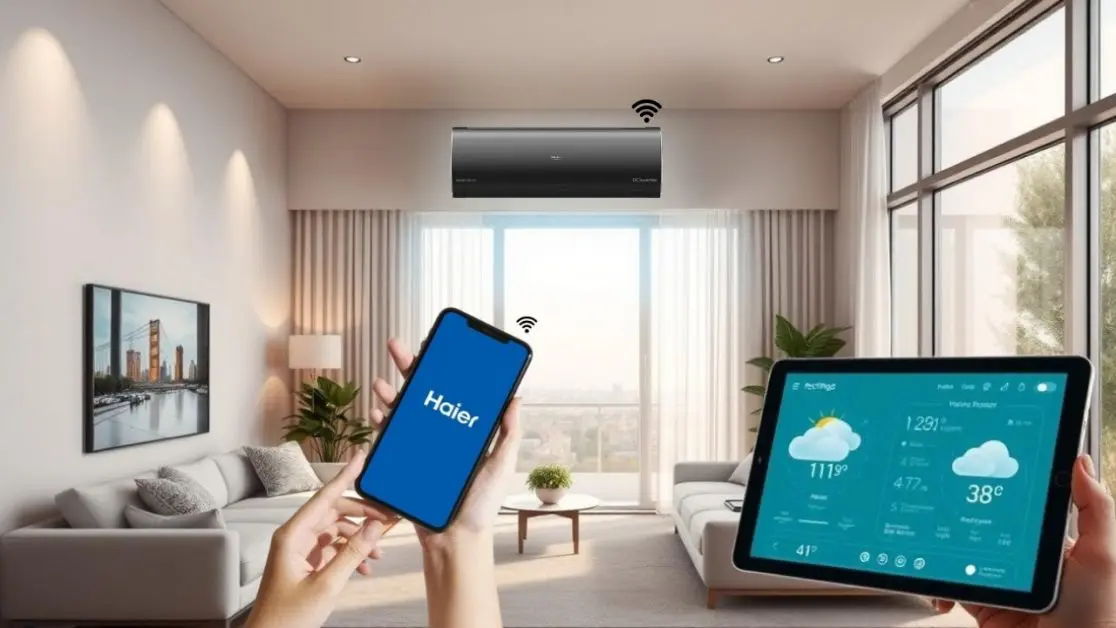AI, Machine Learning (ML), and the Internet of Things (IoT) are transforming how air conditioners (ACs) operate, making them smarter and more energy-efficient. Thanks to these technologies, modern ACs can now automatically adjust their temperature based on real-time weather conditions.
If it’s a hot afternoon, your AC cools down your space accordingly. When the evening breeze sets in, it eases up to save energy, all without you lifting a finger.
This smart automation ensures that indoor comfort is always at its best while keeping electricity bills in check. In this article, we’ll explore how AI is revolutionizing air conditioning, allowing systems to learn user preferences, analyze external weather changes, and optimize cooling accordingly.
We’ll also dive into the benefits of AI-driven climate control in both homes and commercial spaces, along with what the future holds for this exciting technology. Get ready to see how AI is making ACs smarter than ever!
Background

Ordinary air conditioning units rely on preset temperature values that can be controlled manually or through simple programmable thermostats. While these alternatives provide some degree of automation, they do not consider real-time external factors such as rapid changes in temperature, humidity, or seasonal shifts. AI-integrated AC systems, equipped with ML algorithms and IoT sensors, have more effective cooling capabilities because they receive real-time weather data and adjust their cooling functions accordingly.
Artificial Intelligence enhances air conditioning functionality by predicting temperature changes and automatically adjusting settings according to preferred user profiles and surrounding factors. This technology improves user comfort while minimizing energy consumption, helping achieve sustainability targets and reducing electricity costs.
Automation and Weather Adaptation of AI-Driven AC

1. Integrated Real-Time Weather Monitoring
AI-enabled ACs come equipped with IoT-linked sensors and cloud-based weather data programs to constantly collect information for analysis. These systems account for external factors such as:
- Changes in outdoor temperature
- Humidity percentage
- Wind speed and direction
- Chances of rain
- Level of solar radiation
AI systems integrated into smart homes and AC units can autonomously adjust cooling settings to maintain an optimal indoor temperature. For instance, when a heatwave is on the horizon, an AI-enabled AC unit can preemptively lower the room temperature to prevent discomfort. Conversely, when external temperatures drop, the AI may increase the temperature set point to save energy.
2. Machine Learning Algorithms for Predictive Temperature Control
Machine Learning is foundational to the automation of air conditioning in AI-driven systems. These systems analyze AC performance, user habits, and historical cooling requirements alongside weather data to create efficient cooling strategies. Some of the factors these algorithms take into account include:
- Users’ past temperature preferences
- Cooling demands during peak and off-peak periods
- Daily and seasonal weather patterns
- Building insulation and heat retention characteristics
With each learning cycle, the AI system refines its cooling strategies, achieving seamless climate control with minimal human intervention.
3. Adaptive Energy Optimization and Cost Reduction
One of the standout benefits of AI-driven AC automation is energy efficiency. AI algorithms optimize cooling cycles by:
- Reducing compressor workload when external temperatures are lower
- Adjusting airflow and fan speed based on humidity levels
- Cooling occupied areas using occupancy sensors
- Activating eco-mode cooling during low-demand hours
This approach to energy management results in significant electricity bill savings and lower carbon emissions, benefiting both consumers and the environment.
AI-Powered Seasonal Adjustments for Optimal Cooling
AI air conditioning systems do more than react to immediate temperature changes; they also modify system settings based on seasonal patterns. By analyzing historical weather data, AI can adjust AC performance throughout the year. For example:
- During summer, AI algorithms anticipate increased demand and optimize compressor efficiency, airflow, and cooling cycles.
- During monsoon or winter seasons, AI caps the cooling output while enhancing indoor humidity levels to reduce energy costs and maintain comfort.
This adaptability ensures optimal AC performance year-round while minimizing energy consumption.
Expanding AI Capabilities in Air Conditioning

1. Improved User Experience and Integration with Smart Home Technology
AI-enabled AC units enhance user experience by providing greater control and convenience. With smart home integration, users can:
- Adjust temperature settings via mobile apps
- Control AC units through voice assistants like Alexa and Google Assistant
- Receive real-time insights and energy-saving recommendations
- Enable geofencing features that adjust AC settings based on users’ location
These features create a self-regulating cooling experience while effectively managing energy consumption.
2. Enhancement of Air Quality Through AI Technology
Future AI-driven AC units will not only regulate temperature but also monitor indoor air quality. Equipped with smart sensors, these systems can:
- Detect harmful gases and allergens
- Increase ventilation rates to introduce fresh air
- Maintain optimal humidity levels to prevent mold growth
- Provide real-time air quality notifications and improvement suggestions
AI-powered ACs will contribute to better respiratory health and overall well-being by maintaining high indoor air quality standards.
3. Integration of Sustainability and Green Energy
AI-driven air conditioning systems are increasingly designed to work with sustainable energy sources like solar power. These smart ACs can:
- Utilize energy when solar power is available
- Reduce dependence on conventional electricity grids
- Help users monitor and lower their carbon footprints
- Automatically activate low-energy cooling modes during peak grid demand
This sustainable model promotes the adoption of environmentally friendly cooling solutions while supporting global climate change mitigation efforts.
The Future of AI in Air Conditioning
1. Advanced Climate Prediction Models
Future AI-powered temperature control systems will incorporate more sophisticated climate prediction models that analyze multi-dimensional weather data. By leveraging deep learning techniques, these models will anticipate long-term temperature fluctuations, providing even greater control over cooling strategies.
2. Autonomous Maintenance and Self-Diagnosing AC Units
AI is set to revolutionize predictive maintenance, enabling AC units to detect and diagnose potential faults before they cause system failures. AI-driven imaging diagnostic tools will monitor AC components, alerting users to inefficiencies or maintenance needs. This proactive approach reduces downtime, extends the lifespan of AC units, and minimizes repair costs.
3. Integration of AI with Smart Grid Systems
As AI technology advances, smart AC units will synchronize with national power grids to optimize energy consumption. These systems will:
- Adjust cooling requirements based on available energy supply
- Help reduce strain on electrical infrastructure during peak demand periods
- Allow users to schedule cooling cycles for off-peak hours when electricity costs are lower
Such developments will enable AI-powered AC systems to play a crucial role in the energy efficiency strategies of future smart cities.
At the end!
The automation of AI within air conditioning systems is transforming indoor climate management, offering remotely controlled, cost-effective, and self-regulating cooling functions.
By incorporating weather forecasting, predictive ML models, and IoT-driven optimizations, AI-powered AC systems enhance user experience, energy efficiency, and environmental sustainability.
Haier India is actively advancing this technology, implementing AI-driven AC units designed for comfort, efficiency, and environmental conservation.
By adopting smart cooling solutions, Haier India is reshaping the air conditioning industry, paving the way for a new era in climate control.

